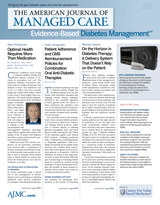- Center on Health Equity & Access
- Clinical
- Health Care Cost
- Health Care Delivery
- Insurance
- Policy
- Technology
- Value-Based Care
Updated Guideline, Research Favor Mediterranean Diet to Control Blood Pressure, Prevent First-Time Stroke
The American Heart Association (AHA) and American Stroke Association (ASA) released an updated guideline last fall recommending the Mediterranean or DASH-style diet (Dietary Approaches to Stop Hypertension) as a way to lower the risk of first-time stroke.1 The guideline update, appearing in the journal Stroke, is just the latest endorsement for consuming a diet rich in fruits, vegetables, whole grains, and nuts, as well as increasing physical activity and not smoking to improve cardiovascular health, control weight, and prevent or reduce the effects of diabetes.2
Recent studies continue to affirm the positive effects of the Mediterranean diet on cardiometabolic and overall health. Among the results:
• Lau, Wong, et al published a study the same day as the new guideline in the American Journal of Hypertension, which tracked a group of patients who already had coronary artery disease. Those who more closely followed the Mediterranean diet were less likely to experience spikes in blood pressure or suffer strokes than those who did not follow the diet closely.3
• A novel study published in December 2014 in the British Medical Journal found that in a randomized controlled trial, patients with reduced sodium intake were less likely to have headaches than those with a normal diet.4
The AHA/ASA guideline update was based on a study led by James Meschia, MD, professor and chairman of neurology at the Mayo Clinic, Jacksonville, Florida. “We have a huge opportunity to improve how we prevent new strokes, because risk factors that can be changed or controlled—especially high blood pressure—account for 90% of strokes,” he said.5
The update included the following specific recommendations:
• Eat a Mediterranean or DASH-style diet, supplemented with nuts.
• Monitor high blood pressure at home with a cuff device.
• Keep prehypertension from becoming high blood pressure by making lifestyle changes such as getting more physical activity, eating a healthy diet, and managing weight.
• Reduce the amount of sodium intake; sodium is found mostly in salt.
• Visit your healthcare provider annually for blood pressure evaluation.1
The update also specifically addressed the issue of medication adherence, which is a significant problem in treating diabetes and high blood pressure.
Patients whose medication isn’t working or is causing intolerable side effects shouldn’t stop taking it—they should ask their doctor for something else, the guideline states.1
The AHA/ASA guideline describes the Mediterranean-style or DASH-style diet as emphasizing vegetables, whole grains, legumes, nuts, seeds, poultry, and fish. Both are limited in red meat and foods containing saturated fats, which are mostly found in animal-based products such as meat, butter, cheese, and full-fat dairy. According to a statement from the AHA, Mediterranean-style diets are generally low in dairy products and DASH-style diets emphasize low-fat dairy products.5
Finally, the AHA statement warns against smoking, especially among womentaking oral contraceptives, and states that avoiding secondhand smoke lowers stroke and heart attack risks.
References
1. Meschia JF, Bushnell C, Boden-Albala B, et al. Guidelines for the primary prevention of stroke: a statement for healthcare professionals from the American Heart Association / American Stroke Association. Stroke. 2014;45(12):3754-3832.
2. Dangi-Garimella S. New studies affirm Mediterranean diet’s potential for patient self-management, prevention of T2DM. Am J Manag Care. 2014;20(SP4):SP113-SP114.
3. Lau KK, Wong YK, Chan YH, et al. Mediterranean-style diet is associated with reduced blood pressure variability and subsequent stroke risk in patients with coronary artery disease [published online October 28, 2014]. Am J Hypertens. 2014. doi:10.1093/ajh/hpu195
4. Amer M, Woodward M, Appel LJ. Effects of dietary sodium and the DASH diet on the occurrence of headaches: results from randomised multicentre DASH-Sodium clinical trial [published online December 11, 2014]. BMJ Open. doi:10.1136/bmjopen-2014-006671.
5. Diets high in fruit, vegetables, whole grains, and nuts among factors to lower first-time stroke risk [press release]. Dallas, TX: American Heart Association; October 29, 2014. http://newsroom.heart.org/news/diets-high-in-fruit-vegetableswhole-grains-and-nuts-among-factors-to-lower-firsttime-stroke-risk.

Quality of Life: The Pending Outcome in Idiopathic Pulmonary Fibrosis
February 6th 2026Because evidence gaps in idiopathic pulmonary fibrosis research hinder demonstration of antifibrotic therapies’ impact on patient quality of life (QOL), integrating validated health-related QOL measures into trials is urgently needed.
Read More
Building Trust: Public Priorities for Health Care AI Labeling
January 27th 2026A Michigan-based deliberative study found strong public support for patient-informed artificial intelligence (AI) labeling in health care, emphasizing transparency, privacy, equity, and safety to build trust.
Read More
Ambient AI Tool Adoption in US Hospitals and Associated Factors
January 27th 2026Nearly two-thirds of hospitals using Epic have adopted ambient artificial intelligence (AI), with higher uptake among larger, not-for-profit hospitals and those with higher workload and stronger financial performance.
Read More
Motivating and Enabling Factors Supporting Targeted Improvements to Hospital-SNF Transitions
January 26th 2026Skilled nursing facilities (SNFs) with a high volume of referred patients with Alzheimer disease and related dementias may work harder to manage care transitions with less availability of resources that enable high-quality handoffs.
Read More

